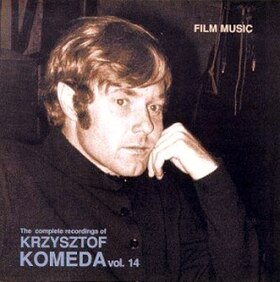Krzysztof Komeda
| Krzysztof Komeda | |
|---|---|

The Complete Recordings of Krzysztof Komeda, Vol. 14. CD cover
|
|
| Background information | |
| Birth name | Krzysztof Trzciński |
| Born |
April 27, 1931 Poznań, Poland |
| Origin | Warsaw, Poland |
| Died | April 23, 1969 (aged 37) |
| Genres | Jazz |
| Occupation(s) | Composer, musician |
| Instruments | Piano |
| Years active | 1956–69 |
Krzysztof Komeda (27 April 1931 – 23 April 1969) — born Krzysztof Trzciński — was a Polish film music composer and jazz pianist. Perhaps best known for his work in film scores, Komeda wrote the scores for Roman Polanski’s films Knife in the Water (1962), Cul-de-sac (1966), The Fearless Vampire Killers (1967), and Rosemary’s Baby (1968). Komeda's album Astigmatic (1965) is widely regarded as one of the most important European jazz albums; British critic Stuart Nicholson describes the album as "marking a shift away from the dominant American approach with the emergence of a specific European aesthetic."
Born Krzysztof Trzciński, he chose Komeda as his stage name only upon graduation from university as a means of distancing himself as musician from his daytime job in a medical clinic. He grew up in and Ostrów Wielkopolski where in 1950 he graduated from the Gymnasium (high school) for Boys'. While at school, he participated in the Music and Poetry Club. After high school he entered the Medical Academy in Poznań to study medicine. He finished his six-year-long studies and obtained a medical doctor diploma in 1956. He chose to specialize as an otolaryngology physician.
He took music lessons from early childhood; to become a renowned virtuoso was his dream. He became a member of the Poznań conservatorium at the age of eight, but World War II thwarted his plans. Komeda explored the theory of music, and learned to play piano, during this period and later, until 1950; however, he was aware of the loss of the past six years. Komeda was interested in light and dance music. He met Witold Kujawski, a graduate of the same school and already a well-known swinging bass player, at the gymnasium (high school) in Ostrów Wielkopolski. It was Kujawski who acquainted Komeda-Trzciński with jazz, and took him to Kraków. The romantic period of Polish jazz, called the catacombs, had its day in the spotlight. Concert publicity did not exist then. Jam sessions, which such famous musicians as Matuszkiewicz, Borowiec, Walasek and Kujawski himself participated in, took place in Witold’s legendary small apartment in Kraków.
...
Wikipedia
